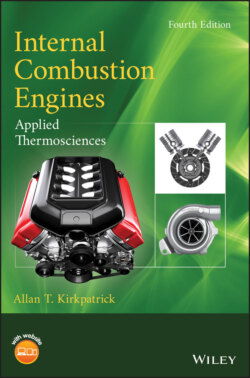Читать книгу Internal Combustion Engines - Allan T. Kirkpatrick - Страница 24
Specific Fuel Consumption
ОглавлениеThe specific fuel consumption is a comparative metric for the efficiency of converting the chemical energy of the fuel into work produced by the engine. As with the mean effective pressure, there are two specific fuel consumption parameters, brake and indicated. The brake‐specific fuel consumption (bsfc) is the fuel flowrate , divided by the brake power . It has three parameters that are standard measurements in an engine test: the fuel flowrate, the torque, and the engine speed. The brake‐specific fuel consumption for naturally aspirated automobile engines depends on the engine load and speed, and can have values ranging from about 175 to 400 g/kWh.
(1.22)
The indicated specific fuel consumption (isfc) is the ratio of the mass of fuel injected during a cycle to the indicated cylinder work, and is used to compare engine performance in computational simulations that do not include the engine friction.
(1.23)
An engine performance map is used to present the effects of speed and load on engine performance, as shown in Figure 1.10. The engine speed or the mean piston speed is plotted on the ‐axis, and the brake mean effective pressure (bmep) is plotted on the ‐axis. Contour lines of constant bsfc are plotted on this load‐speed plane. The lines of constant bsfc are approximately independent of displacement for a given engine family, so engine performance maps can be used to match an engine with a given load. For a spark‐ignition engine, the upper envelope on the map is the wide open throttle line. Its shape reflects variations in the volumetric efficiency with engine speed, although small changes in inlet air density are also involved.
Figure 1.10 Performance map of bmep and bsfc versus mean piston speed for an automotive spark‐ignition engine.
The specific fuel consumption and engine efficiency are inversely related, so that the lower the specific fuel consumption, the greater the engine efficiency. Engineers use bsfc rather than thermal efficiency primarily because a more or less universally accepted definition of thermal efficiency does not exist. We will explore the reasons why in Chapter 04. Note for now only that there is an issue with assigning a value to the energy content of the fuel. Let us call that energy the heat of combustion ; the brake thermal efficiency is then
(1.24)
Inspection of Equation (1.24) shows that bsfc is a valid measure of efficiency provided is held constant. Thus, two different engines can be compared on a bsfc basis provided that they are operated with the same fuel.
